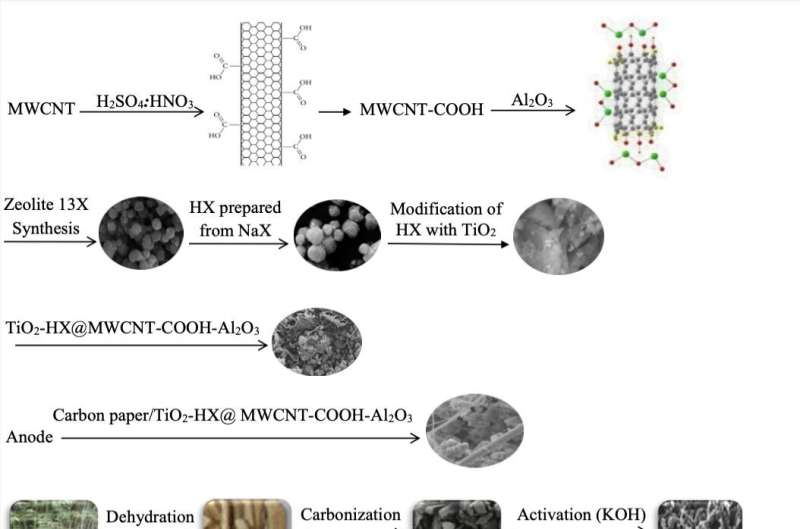This article has been reviewed according to Science X's editorial process and policies. Editors have highlighted the following attributes while ensuring the content's credibility:
fact-checked
peer-reviewed publication
proofread
Turning vegetable oil industry waste into power: Electrode modification improves wastewater treatment

In recent years, there has been growing interest in harnessing microorganisms for simultaneous wastewater treatment and renewable bioelectricity production. Microbial fuel cell (MFC) technology can convert the chemical energy stored in organic matter in wastewater into electricity, using bacteria as a catalyst. Researchers in Iran have been investigating how modification of the electrodes can improve the performance of this technology.
In a new study, published in the Journal of Chemical Technology and Biotechnology, researchers have developed a novel and cost-effective anode catalyst (TiO2-HX@MWCNT-COOH-Al2O3) that can improve and stabilize the power generation performance of MFCs treating vegetable oil industry wastewater.
The choice of anode material is key to dictating the efficiency and cost-effectiveness of MFCs, as it is the site at which bacteria grow and form a biofilm. Dr. Hossein Jafari Mansoorian, Hamadan University of Medical Sciences, Iran, explains, "Electrode design is the greatest challenge in making MFCs a cost-effective and scalable technology. The anode of MFCs […] plays a vital role in the extracellular electron transfer between the electroactive bacteria and solid electrode surface. In this regard, it is of crucial importance to develop a novel anode material with synergistic effects between the properties of the anode surface and microorganisms."
Dr. Mansoorian notes that a desirable anode should offer the following properties:
- Good conductivity to speed up the electron transfer rate
- Excellent biocompatibility and low bio-toxicity for microbes
- Higher specific surface area to provide more microbe attachment and catalytic activity sites
- Chemical stability and anti-corrosion resistance
- Flexibility and durability
- Low economic cost and convenience to commercial application
"In order to improve bacterial adhesion and efficient electron transfer between bacteria and the electrode surface, the electrode should be modified and its surface area increased to ensure efficient current collection and power yield through the decomposition of organic compounds in the wastewater […] Based on the results of this study, TiO2-HX@MWCNT-COOH-Al2O3 structure of this composite is a suitable candidate for modifying the anode electrode and greatly enhances electroactivity," explains Dr. Mansoorian.
The team also investigated modification of the cathode to identify a cost-effective alternative to platinum. Carbon felt modified with powdered activated carbon (PAC) originating from Bambuseae (a family of bamboo plants) was found to be effective.
The findings from this study are the latest in continuing efforts to improve MFC performance. Dr. Mansoorian noted that in recent years, "a tremendous breakthrough has been made regarding power output in MFCs from a few mW⋅cm-2 or mW⋅cm-3 to several W⋅cm-2 or W⋅cm-3, an improvement of three orders of magnitude, owing to continuous efforts of researchers."
As global energy demand increases and fossil fuel concentration recedes, attention is turning to new energy sources. "Energy generation, storage and consumption are topics that are increasingly prevalent within modern research fields and are of global interest and importance. The use of fossil fuels, especially oil and gas, in recent years has accelerated and this is triggering a global energy crisis. Renewable bioenergy is viewed as one of the ways to alleviate the current global warming crisis," Dr. Mansoorian observes.
The large volumes of wastewater generated by the vegetable oil industry mean that the high energy requirements of conventional wastewater treatment are unsustainable. Dr. Mansoorian notes, "Since traditional wastewater treatment has various limitations, sustainable implementations of MFCs might be a feasible option in wastewater treatment as well as green electricity production, bio-hydrogen synthesis, carbon sequestration, and environmentally sustainable sewage treatment."
Asked about the scalability of MFCs, Dr. Mansoorian explains that "although some basic knowledge has been gained in MFC research, there is still a lot to be learned in the scale-up of MFC technology for large-scale applications."
"For MFCs to be a viable option for wastewater treatment, they need to be scaled up to accommodate large volumes of incoming wastewater, which has proven challenging for several reasons, including minimizing the distance between the anode and cathode to reduce electrical losses and being cost-competitive with other treatment technologies.
"The materials used are expensive, including membranes to separate the electrodes, which are prone to fouling, and a catalyst to produce enough power. At last, after obtaining superior anode electrodes, it is necessary to examine their long-term performance in real wastewater treatment to investigate their stability, durability, mechanical properties and secondary pollution effects," he elaborates.
Nonetheless, Dr. Mansoorian notes that "MFCs undoubtedly have potential in terms of energy recovery during wastewater treatment, occupying a market niche in terms of a stand-alone power source and also in the direct treatment of wastewater."
More information: Kamyar Yaghmaeian et al, Treatment of vegetable oil industry wastewater and bioelectricity generation using microbial fuel cell via modification and surface area expansion of electrodes, Journal of Chemical Technology & Biotechnology (2022). DOI: 10.1002/jctb.7301
Journal information: Journal of Chemical Technology and Biotechnology
Provided by Society of Chemical Industry





















